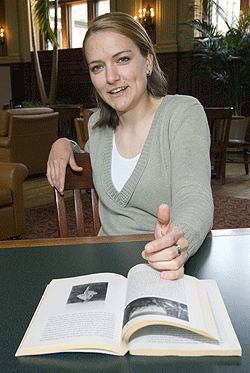The first person in her family to pursue a university degree, Heike Polster has come a long way from the spunky, inquisitive girl in Bergrheinfeld, Germany, who wanted most of all “to become a dentist’s wife,” she says.

Photo by David Kilper
German-born Heike Polster discusses the novel “Austerlitz” by W.G. Sebald, whose work she included in her thesis. The first in her family to earn a college degree, she studied American literature in Germany and German literature in America.
It was frequent trips to the library that expanded her horizons. “I spent so much time there,” she recalls, “that my parents probably should have paid them rent.”
For Polster, who receives a doctorate in Germanic languages and literatures from the Graduate School of Arts & Sciences May 18, timing is everything. She launches her academic career with a body of research on how we think of and perceive time.
“The dissertation stage is tough for us,” Polster says of her convivial group of doctoral colleagues. “Basically, we sit by ourselves and write a book.”
Polster’s “book” examines how narratives and aesthetic images probe philosophical concepts of time and space.
“What engages me,” Polster says, “is how experiences such as the Holocaust factor into the cultural narrative that we keep telling ourselves. Or, in the German context, it often is the case of not telling ourselves or keeping silent.”
Such exploration defines who we are, she adds, and is necessary in the post-modern environment where people are overwhelmed with news and images.
In her own case, Polster defines who she was as a child by saying, “Suffice it to say that I read a lot, ran with the boys and sang in the choir.”
In her teens, she fed a passion for culinary arts at Motherwell Technical College in Motherwell, Scotland. Then, she changed course.
She entered Otto-Friedrich Universität in Bamberg, Germany, and studied philosophy, history, and English and American literature.
Through a collaboration with her university, she came to the United States to study for two years at the University of Georgia, where she went on to earn a master’s degree in German literature.
At Georgia, a strong advising committee of women — whom Polster calls “realistic role models” — set her on the path to academe.
She was twice recognized for excellence in teaching with the Outstanding Teaching Assistant Award and also received the Outstanding German Graduate Student Award.
When it came time to explore doctoral programs, WUSTL won out. A factor for Polster was the possibility of working with Lutz Koepnick, Ph.D., professor of German and of film and media studies, both in Arts & Sciences. Indeed, Koepnick became her adviser.
Polster is pleased with her choice of programs.
“Over the years, I’ve enjoyed the sense of community here, the friendly exchange among graduate students and the excellent mentorship,” she says.
|
Graduate School of Arts & Sciences |
Polster is a valued mentor in her own right.
“Heike’s service to the University in general and to the Peer Mentoring Program in particular has been superb,” says Nancy Pope, Ph.D., associate dean of the Graduate School of Arts & Sciences.
Polster also has served as a graduate student senator, graduate student representative to the faculty and member of the Graduate Student Research Symposium Committee.
This fall, Polster will put her work into play at the University of Memphis, where she has accepted a tenure-track position on the German faculty.
She is — and will make — an excellent instructor, Koepnick says. “Heike is a rigorous, intellectually astute and impressively mature researcher. Her thinking and writing are reflexive, probing, independent. She is demanding, very much concerned about the progress of her students and eager to draw the best effort from each and every one.”
In addition to her intellectual pursuits, Polster has a sense of recreational adventure, including traveling and rock climbing.
“We Germans love to travel,” she says. Her favorite destinations: “Rainy, windy places. The Pacific Northwest, Britain and the Baltic States.”
Koepnick says that sense of adventure defines Polster’s well-roundedness.
“The fact that Heike goes rock climbing once a week sums it up: She has enormous focus, a great sense of challenging herself, but also great ability to switch off academic efforts for a moment and do nothing but live a good life,” Koepnick says.